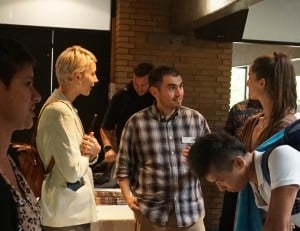I stepped onto the afternoon train feeling hopeful and inspired – not a usual feeling before taking the long commute back to London. The Conservation Optimism (CO) Summit had broken through my quotidian routine of train to desk and desk to train with a renewed sense of purpose.
Settling into a seat amongst the other passengers, I pondered on how months ago when offering to volunteer at the summit, I’d been sure I was a ‘Conservation Optimist’ as a self-proclaimed ‘glass-half-full’ type. Yet, I’d come to learn over the past three days of the summit that the CO movement was so much more than ‘looking on the bright side’. Just a few hours earlier EJ Milner-Gulland, founder of this movement, had remarked in her closing plenary that to her, CO was about confronting the huge challenges we face in the world, learning from failures and celebrating and sharing successes, big and small. These concepts were ones I’d come to explore in the variety of workshops and talks held, and in the experiences of the attendees that I had met.
Facing up to the challenges of global environmental change can be overwhelming, particularly when your chosen profession causes you to confront these ideas on a daily basis. It was Caroline Hickman who, during her interactive workshop using paradigms from psychotherapy, encouraged us all to face these fears to become more resilient change agents.

Integrating ideas from other disciplines was a common thread throughout the summit. “Part of the problem is that conservation is filled with conservationists,” remarked Alex Dehgan during his plenary talk. His story of success in using interdisciplinarity to create conservation solutions offered a hopeful vision of the future. Thinking back to that lecture theatre filled with a plethora of creative minds from a variety of backgrounds, maybe this vision is not as far-off as we think.
#Youth4ourplanet offered another uplifting topic of discussion throughout the summit. The presence of youth panels and representation from community conservation leaders carried the message that no-one should feel powerless to act in the face of environmental change.
Back on that home-bound journey, ideas from the last three days buzzed through my brain as the train sped through the Oxfordshire countryside. It occurred to me that the culture of inclusivity and support we were striving for had already been in practice throughout the summit. Particularly behind-the-scenes in the team of volunteers I’d come to be a part of. Each volunteer had brought their individual strengths and experiences to the group, ensuring that any problem to arise would never have to be faced alone. I hoped that this dynamic was something that could be replicated across the conservation field, and was grateful to have been part of a team that had ensured the CO summit could once again take place and continue to inspire.
Beginning the routine approach to London Paddington I gathered my thoughts and belongings, looking forward to the journey ahead as a self-proclaimed ‘conservation optimist’, now fully aware of what that entailed.


